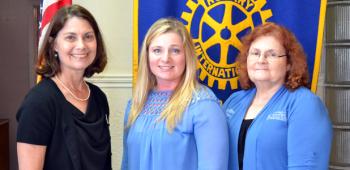
From left, Rotary Club of Crowley President Mary Zaunbrecher, left, thanks Angelique Credeur (guest speaker) and Rotarian Bertha Mire (program organizer) for Tuesday’s program on long-term and short-term admissions to nursing homes.
Opening the dialogue on long term placement
Jeannine LeJeune is the online editor for the Crowley Post-Signal. She can be reached at jeannine.lejeune@crowleytoday.com or 337-783-3450.
There may not be a more difficult and/or awkward conversation to have with a loved one as the one that concerns nursing homes.
Often times, that conversation comes late in the game, when a loved has started changing as a person or has been admitted to a hospital and the need for long-term care has become obvious.
It’s perhaps what makes the discussion so difficult as the needs now outweigh the particular wants of the individual in question.
That is why Regional Admissions Coordinator for Encore and Southwind Healthcare and Rehabilitation facilities Angelique Credeur urges starting the dialogue now.
Credeur, who spoke to the Rotary Club of Crowley Tuesday presented information on both long-term and short-term admissions and the process that is involved in those admissions.
Mainly, a patient must meet certain criteria to be admitted and must be evaluated. As there are only so many beds in the state of Louisiana, the state requires evaluations for people being admitted into nursing home facilities.
Part of Credeur’s job is the assessment of patients to see how extensive their needs are and so forth.
But as people meet the criteria and are admitted, it’s often not a topic discussed by a family until it’s necessary. That part can be avoided where as assessments cannot.
Credeur, as well as Southwind Healthcare and Rehabilitation Admistrator Bertha Mire, both welcomed Rotarians to come to the facilities and visit them, allowing elderly parents the chance to see that the nursing homes that they knew as children and young adults are not the nursing homes of today.
“Things have changed,” said Credeur. “Our company (ElderOutreach) is phenomenal.”
“Part of this today is we’re inviting you to come visit,” added Mire.
Those visits, perhaps of a friend already living at the facility, be it short or long term, or tours can help be part of the opening notes of the dialogue that can save a lot of stress for families later on.
Credeur explained that involving the loved one early on in the discussion allows him or her to actively contribute his or her desires, goals and/or plans for the future. And, although reasons for needing long term care vary from patient to patient, having a general, pre-determined plan or advanced directive can help ease the transition when the time comes.
Then it is time to assess whether long-term care is needed, based on physical and mental symptoms he or she may be exhibiting.
Credeur presented information that provided some of these symptoms to the Rotarians including risk of falling; requiring assistance dressing eating, bathing, etc. and many more physical ones; as well as frequent irritability, disorientation about place and time and more on the mental side.
She added that family meetings can move the discussion more toward a plan as symptoms become more prevalent. The important thing, however is the need to continue to involve both the family and the loved one in question.
As both Southwind and Encore are long-term facilities as well as short-term therapy facilities, it is not just a place for the acutely ill elderly.
There are some that live in the facilities for only a short time, as directed by doctor’s orders, and go through therapy while under the facilities’ roof.
Credeur explained that physical, occupational and speech therapies are offered at the facilities.
- Log in to post comments
